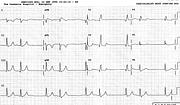Tall Cerebral T Waves
Report:
Sinus tachycardia
Prominent T waves
Nonspecific ST segment depression
Prolonged QT interval
Comment:
This question can only mean something in a specific context. The context was one of eventually fatal cerebral œdema associated with (?produced by) hyponatræmia in a young woman following minor surgery. It by now a distinct syndrome in its own right98.
Serum potassium remained normal throughout. Those who thought of hyperkalæmia would fail to explain the cerebral catastrophe; also the QT interval is too long. Combined hyperkalæmia and hypocalcæmia, seen in chronic renal failure patients? The context is wrong. Sodium of course has no direct effect on the electrocardiogram. The tall, admittedly peaked, T waves are of cerebral origin. Similar phenomenon, also in a young woman, has been recently described following head injury99.
Below is the patient’s trace taken 12 hours later (Fig 136a), when she was already (brain) dead. The T waves are still prominent, but within normal range apart from the prolonged QT interval.
If you have any suggestions for or feedback on this report, please let us know.
Hi, can we chat about some terms and conditions?
The library and it's records are licensed under the Creative Commons Attribution 4.0 International license.
You are free to:
- Share — copy and redistribute the material in any medium or format for any purpose, even commercially.
- Adapt — remix, transform, and build upon the material for any purpose, even commercially.
- The licensor cannot revoke these freedoms as long as you follow the license terms.
Under the following terms:
- Attribution — You must give appropriate credit , provide a link to the license, and indicate if changes were made . You may do so in any reasonable manner, but not in any way that suggests the licensor endorses you or your use.
- No additional restrictions — You may not apply legal terms or technological measures that legally restrict others from doing anything the license permits.
By clicking agree below, you are agreeing to adhere to CC BY 4.0.
